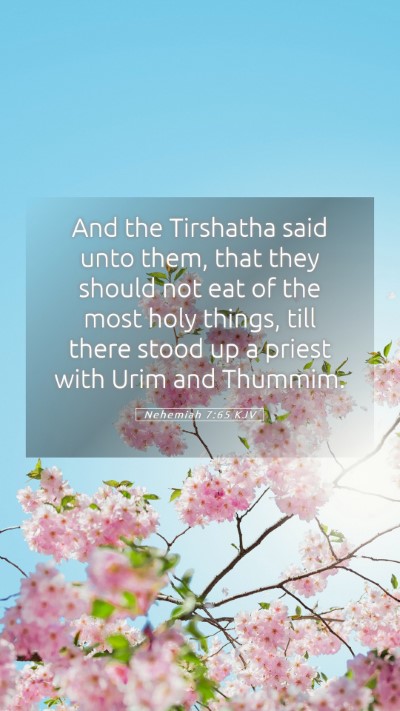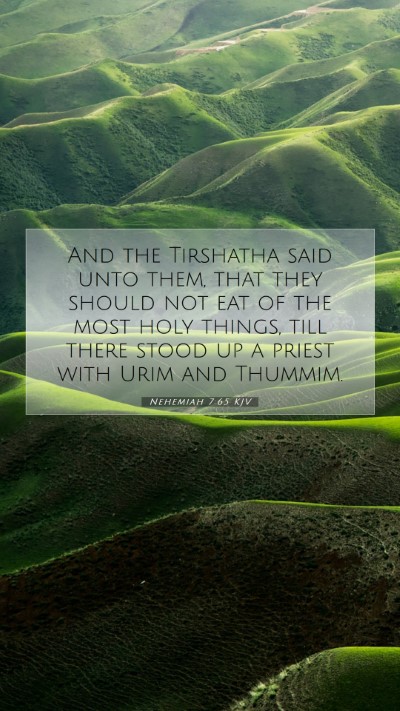Understanding Nehemiah 7:65
Nehemiah 7:65 states:
"And the Tirshatha said unto them, that they should not eat of the most holy things, till there stood up a priest with Urim and Thummim."
This verse relates to the broader themes of purity, governance, and the importance of proper leadership in worship among the Israelite community post-exile. Below is a summary of insights derived from various public domain commentaries.
Bible Verse Meaning
In analyzing Nehemiah 7:65, we explore the implications of excluding certain individuals from consuming "the most holy things" until a qualified priest is appointed. This prohibition emphasizes the need for holiness and the necessity of adhering to the established guidelines for worship.
Commentary Insights
-
Matthew Henry:
Henry emphasizes the role of the high priest in ensuring that the sacred elements of worship are appropriately handled. The presence of a legitimate priest with the Urim and Thummim was essential for determining the will of God and for making decisions regarding spiritual matters. This necessity illustrates the importance of divine guidance and the acknowledgment that not all individuals are fit to partake in holy practices.
-
Albert Barnes:
Barnes explains that the reference to the Tirshatha (a title for Nehemiah) indicates the authority he held in Jerusalem. By restricting access to the most holy things, Nehemiah was reaffirming the sanctity of the Temple and the worship practices. Barnes discusses the Urim and Thummim as tools for divining God’s will, signifying that spiritual discernment and direction are critical during this re-establishment period for Israel.
-
Adam Clarke:
Clarke provides a historical backdrop to this restriction, focusing on the rebuilding of the nation after Babylonian exile. He points out that the returnees were expected to cultivate a distinct identity rooted in holiness. The delay in consuming the holy offerings showed a need for divine leadership—a reminder that God's requirements must be understood and fulfilled with the proper governance established.
Thematic Analysis
The themes surrounding Nehemiah 7:65 contribute to a broader understanding of Scripture:
- Holiness: The verse illustrates the importance of purity and the seriousness with which sacred duties are to be handled.
- Divine Guidance: The requirement of a priest with the Urim and Thummim underscores the reliance on God for wisdom in leadership.
- Community Governance: Nehemiah’s authority exemplifies the need for strong, righteous leadership in restoring national identity and religious practices.
Application for Believers
For modern believers, Nehemiah 7:65 serves as a reminder of the following:
- Seek the counsel of God through prayer and the guidance of spiritual leaders.
- Approach worship and sacred practices with reverence and an awareness of one's personal conduct.
- Value the importance of community and leadership in navigating faith and practice.
Cross References
Related Bible verses that enrich the context of Nehemiah 7:65 include:
- Exodus 28:30 - Discusses the Urim and Thummim as part of the high priest's attire.
- Leviticus 10:10 - Addresses the distinction between holy and common, underscoring the significance of holiness in worship.
- Ezra 2:63 - Similar content about the restrictions regarding who may eat of holy offerings.
Conclusion
In summary, Nehemiah 7:65 communicates crucial lessons about the nature of holiness, the importance of divine guidance, and the role of leadership in religious practices. By reflecting on this verse, individuals can deepen their understanding of Scripture and its application to their lives.


